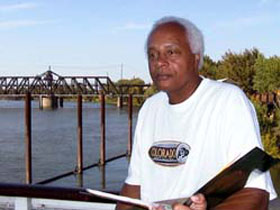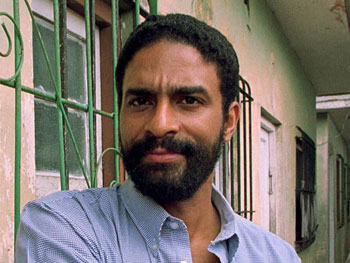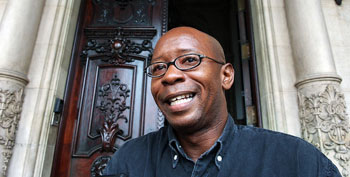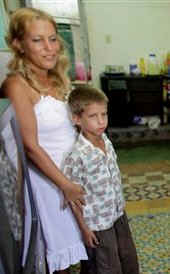|
Cuban opposition pleased by African American support.

By Professor Emeritus, David Covin.
(Radio
Martí) - A group of African American activists are
considering forming a permanent watchdog group to monitor
racial discrimination in Cuba. The 60 activists published a Statement
of Conscience by African Americans denouncing social
inequalities, marginalization and the scorn of the Castro
government against blacks in the island.
We are considering forming a group to follow this
situation via international human rights and civil rights
organizations, said David Covin, professor emeritus at the
University of California at Sacramento and former president
of the National Conference of Black Political Scientists.
The four page letter
calls on the government of Raul Castro to end the
unnecessary and brutal harassment of blacks and the growing
persecution waged by the authorities against African
American movements.
"There has been ample repercussion in local and
international media after the statement was published"
said Professor Covin. We are distributing the letter, first
to the media and of course, each person who signed is also
distributing the letter to the organizations they represent.
Covin added that the idea is to call attention to the
issue, particularly amongst black Americans.
"We know firsthand the experiences and the
consequences of denying civil freedoms on the basis of race,
and we certainly understand what racial discrimination is
and does to people. For that reason we are even more
obligated to voice our opinion on what is happening to our
Cuban brethren a few miles away," said the black
American scholars, artists and professionals.
Political prisoner Oscar Elias
Biscet found out about the letter from Radio Marti
staffers. Biscet, president of the independent group Lawton
Foundation is serving a 25 year sentence at Combinado del
Este prison. "I found out via Radio Marti, because we
don't have electricity, we can't have access to the news,
not even the official news," he said in a brief phone
interview. The activist said he was pleased that at last
black Americans have understood the suffering of
Afro-Cubans.

Dr. Oscar Elías Biscet, presidente
de la Fundación Lawton de Derechos Humanos y prisionero de
conciencia cubano.
"They are now on the side of justice and it is very
important for Afro-Cubans to have on our side our American
brothers, they have fought against racism, they have fought
for the ideal of equality and democracy in the United States
and we need that here to," said Oscar Elias Biscet.
Cuba official Internet site "Cuba Debate"
reacted to the letter by criticizing the authors and calling
them liars.
"We cannot sit idly by and allow for decent and
dedicated civil rights activists in Cuba and the black
population as a whole to be treated with callous disregard
for their rights as citizens and as the most marginalized
people in the island. Racism in Cuba, and anywhere else in
the world, is unacceptable and must be confronted ",
added the statement of African American activists.
In an addendum containing statistics on the black
population in Cuba, the authors cite the high percentage of
black and mulattos that make up the population.
Oscar Elias Biscet confirms the assessment saying that
even though the majority of Cubans are either black or
mixed, there is no proportionate representation in
government, no proportionate access when it comes to
economic means. Racism in Cuba is evidenced in the racial
composition at the helm of power. The proportion of blacks
and mixed raced Cubans in prison is higher. But segregation
is not limited to race, it also has to do with ideology,
according to Doctor Biscet.
The document of African American leaders has had a
positive impact in the opposition movement in Cuba. Manuel
Cuesta Morua of the Party Arco
Progresista, said that that the importance of the
document lies in the fact that the group of supporters have
supported the Cuban government with the understanding that
the authorities where doing all they could to support racial
integration. Unfortunately, added Cuesta Morua, this has not
been the case, so now African Americans are sensitive to
this and I think this is the message. "We should
consider this a historic document, said Cuesta Morua; we
have not seen this in the past. Those of us who are
struggling here, fighting for racial equality and civil
rights, now we are going to more international solidarity
and support for our struggle".

Manuel Cuesta Morúa, presidente del
Partido Arco Progresista.
Morua continued saying that as far as the petition itself
that in Cuba these are principles shared not only by blacks
but by all citizens.
The statement mentions specifically the case of Doctor
Darsi Ferrer, a physician, jailed since July of this
year and called for his immediate release. His wife read the
letter and told Radio Marti that she felt hopeful. For
Yusnaimi Jorge Soca, the evidence of racism in Cuba is part
of everyday life and the evidence is everywhere, the slums
where blacks live, the low salaries they receive, and police
abuse.
|

|
|
Dr. Ferrer's wife, Yusnaimi
Jorge Soca and son
|
"This letter is a very positive step, said Jorge
Soca, because before no one wanted to talk about this. There
has always been the notion that racism in Cuba did not exist
but this is a lie", she added.
Statement
of Conscience - Radio and TV Martí pictures.
-- www.martinoticias.com/FullStory.aspx?ID=3D75656C-
492B-4EFD-9021D8F4401D7051
|



